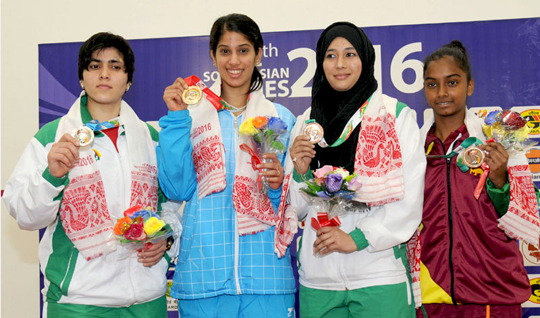Guwahati, Feb 9: Star player Joshna Chinappa clinched the gold in women's individual squash after beating Maria Toorpaki Wazir of Pakistan in a tense and ill-tempered summit clash to make up for India's disappointment in the men's event on Monday.
Top seed Chinappa, ranked 14th in the world, recovered from one set down to beat second seeded Wazir 10-12 11-7 11-9 11-7 at the brand new squash facility at the R G Baruah Sports Complex here.
With Chinappa's gold, India has so far won three medals in squash with Sourav Ghosal and Harinder Pal Singh Sandhu having grabbed a bronze each after losing to their Pakistani opponents yesterday.
Chinappa, one of the few top Indian players to have opted to play in the SAG, thus gave some solace to the team management after men's players failed to reach the final.
The women's final match had all the drama which was witnessed during the men's semifinals with Chinappa expressing unhappiness to the match officials with the "aggressive" play of Wazir who was seen as trying to be a bit physical with the top-ranked Indian.
Wazir, ranked 50th in the world, won the first set 12-10 after a neck-and-neck contest but she got injured midway in the second set at 7-7 as blood came out of her left eyebrow region after contact with Chinappa and play was stopped for a while to get her treated.
The Pakistani was immediately given first aid and she resumed play after a few minutes. It looked like the break gave Chinappa time to ponder on her game and the glamorous Indian started dominating the match from there on.
Wazir looked tentative just after coming from her injury break and Chinappa did not take much time to take the second set 11-7 and level scores at 1-1.
The third set saw Chinappa taking a 5-2 lead but Wazir came back with some superb shots to make it 6-6 and then 8-6. By then there was tension among the crowd at the stands, but a calm Chinappa just went about her job and brought the score to 9-9 and then 10-9 before taking the set.
In the fourth and final set, Wazir gave some fight initially but later frittered away as Chinappa won it 11-7 to give India the first gold in squash in this edition.
Chinappa later made it known that she was not happy with the way the referees handled the match and that she did not enjoy playing the match as her opponent was "very aggressive" and "not playing fair".
"Wazir is a good player but she was very aggressive. Fortunately, I won the gold but I did not enjoy playing the final. I play in the professional circuit and there, these kind of things, likes lot of interference and blocking (by rival player) does not happen," she said after the match.
"I tried to keep myself calm but I had to let them (match officials) know what was happening on the court. I cannot let things happening all the time," said Chinappa, who argued with the referee on a couple of occasions.
"I am a kind of player who plays fair, without these interfering and blocking etc. Doing all these is not nice for the spectators and also for the game," she added.
Asked if the referees should have handled the situation better, she said, "I don't want to be in trouble again but I feel it is their job to control the match and stop all those things. They should have done better."






Comments
Add new comment